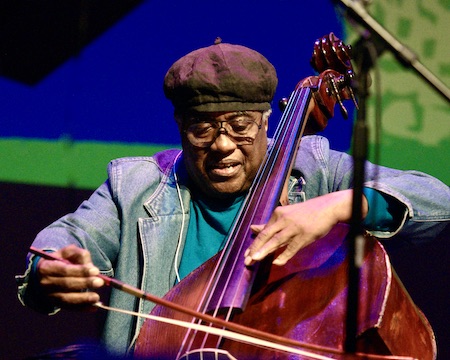Jan 13, 2026 2:09 PM
More Trump-Kennedy Center Cancellations
The fallout from the renaming of the John F. Kennedy Center for the Performing Arts to include President Donald…

Davis (1930–2023) was remarkable for his ability to adapt to seemingly any style.
(Photo: R.I. Sutherland Cohen)Richard Davis, a bassist whose virtuosity was equaled by his astounding versatility, died Sept. 6 in Madison, Wisconsin. He was 93.
His death was confirmed by his daughter, Persia, who has created an online memorial page. Cause of death was not given; however, Davis had for some time been in ill health, spending his final two years in hospice care.
A Chicago native, Davis came up in the Windy City’s robust post-World War II jazz scene. However, he was a classically trained player, and worked regularly in that context as well as in Broadway pit orchestras, film and television, commercial jingles and pop music crossovers. Indeed, Davis is perhaps as famous for his work on Van Morrison’s seminal 1968 folk-rock album Astral Weeks. His other collaborators included Leonard Bernstein, Igor Stravinsky and Bruce Springsteen.
Even within the jazz genre, however, Davis was remarkable for his ability to adapt to seemingly any style. His work as an accompanist ran the gamut from Sarah Vaughan and Frank Sinatra to Eric Dolphy and the Thad Jones–Mel Lewis Orchestra. In each circumstance he evidenced an immediately distinctive sound: a physical, percussive authority, precise intonation and pointed use of the instrument’s entire range. The DownBeat International Critics Poll rated him Best Bassist every year from 1967 to ’74.
“I’ve done some great things,” he acknowledged in a 2019 interview. “I’ve had some phenomenal associations with some great composers, conductors, colleagues and the whole bit.”
In addition to his 3,000-plus recording credits across multiple genres and styles (including more than a dozen jazz albums under his own name), Davis was a longtime and widely respected musical educator. He spent four decades teaching bass, improvisation and jazz history at the University of Wisconsin–Madison, not retiring until he was well into his eighties.
He also founded the Richard Davis Foundation, a nonprofit that provides networking and performing opportunities for young bassists from around the world.
Davis was born April 15, 1930, in Chicago, growing up on the city’s South Side. As a child, he and his two older brothers formed a vocal trio with a cousin as conductor; Richard sang the lowest part, which sparked his interest in the bass. His study of the instrument took him to Chicago’s DuSable High School, where he was a student of legendary educator Captain Walter Dyett. Dyett encouraged Davis to join the Youth Orchestra of Greater Chicago, which he did. Davis then attended VanderCook College of Music, where he studied with Chicago Symphony Orchestra bassist Rudolf Fahsbender.
Davis began playing with Chicago pianist Ahmad Jamal in 1952, then in 1954 embarked for New York. He worked with pianist Don Shirley for two years before being hired by vocalist Sarah Vaughan, with whom he finished out the 1950s. During his time with Vaughan, Davis built a prolific career as a freelance bassist, working in music of every variety. His credits included Kenny Burrell’s A Night At The Vanguard (1959), John Lewis’s Essence (1962), Andrew Hill’s Point Of Departure and Eric Dolphy’s Out To Lunch (both 1964). In 1966, he became the founding bassist in the Thad Jones–Mel Lewis Orchestra, where he remained until 1972.
In addition to Astral Weeks — which critic Greil Marcus called “the greatest bass ever heard on a rock album” — Davis recorded pop and rock albums with Springsteen, Laura Nyro and Paul Simon. He also worked in the classical arena with Leopold Stokowski, Pierre Boulez and Gunther Schuller in addition to Stravinsky and Bernstein.
He had become one of the most respected and in-demand bass players in the world when Davis finally accepted one of many offers from the University of Wisconsin in 1977. While he then built an equally formidable reputation as an educator, Davis also became an activist, founding the Madison chapter of the Institutes for the Healing of Racism.
He received an NEA Jazz Masters fellowship in 2014. In 2018, the city of Madison named a street after him.
In accordance with Davis’ wishes, there will be no public funeral or memorial. DB

Belá Fleck during an interview with Fredrika Whitfield on CNN.
Jan 13, 2026 2:09 PM
The fallout from the renaming of the John F. Kennedy Center for the Performing Arts to include President Donald…

Peplowski first came to prominence in legacy swing bands, including the final iteration of the Benny Goodman Orchestra, before beginning a solo career in the late 1980s.
Feb 3, 2026 12:10 AM
Ken Peplowski, a clarinetist and tenor saxophonist who straddled the worlds of traditional and modern jazz, died Feb. 2…

The success of Oregon’s first album, 1971’s Music Of Another Present Era, allowed Towner to establish a solo career.
Jan 19, 2026 5:02 PM
Ralph Towner, a guitarist and composer who blended multiple genres, including jazz — and throughout them all remained…

Rico’s Anti-Microbial Instrument Swab
Jan 19, 2026 2:48 PM
With this year’s NAMM Show right around the corner, we can look forward to plenty of new and innovative instruments…

Richie Beirach was particularly renowned for his approach to chromatic harmony, which he used to improvise reharmonizations of originals and standards.
Jan 27, 2026 11:19 AM
Richie Beirach, a pianist and composer who channeled a knowledge of modern classical music into his jazz practice,…